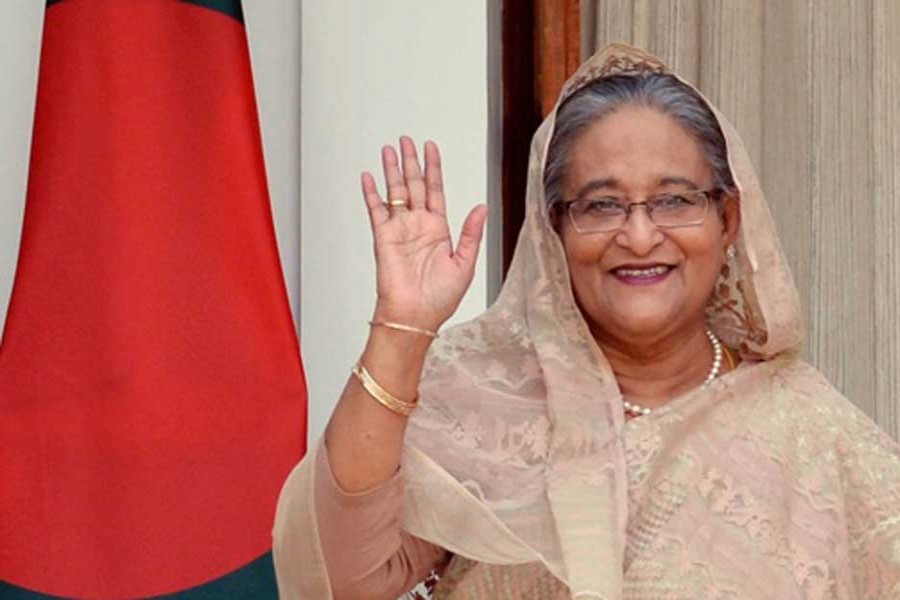The Prime Minister Sheikh Hasina visited Sydney (26-28 April) at the invitation of the Australian Prime Minister Malcolm Turnbull and the organisers of the Global Summit of Women (GSW) to receive the prestigious 2018 Global Women's Leadership Award for her contribution to the advancement of women education and entrepreneurship. The GSW is a US-based non-governmental international organisation engaged in women's empowerment around the world.
The GSW is an annual assembly of the world's women leaders. It has a glorious history of more than 26 years of commendable actions and achievements. Informally termed "The Davos for Women", it is also defined as "Business Summit" or "Voice of Women". It essentially emphasises strategies of women's substantial empowerment and development in society, politics and economy in the world.
PM Hasina in her speech at the Sydney Summit pitched for the creation of a new global partnership to further advance women's politico-economic rights and empowerment vigorously and positively. The 2018 summit was participated by about 1,500 leaders of diverse backgrounds from both public and private sectors of over 80 countries across the world.
She asked the world women leaders to make concerted efforts to raise the status of the marginalised and unprotected women. Indeed, women are still highly disadvantaged in many parts of the world suffering from malnutrition, illiteracy. They are often poorly paid and sexually violated. Hasina also spotlighted in her address that Bangladeshi women have played a commendable role in the language movement of 1952, autonomy movements of 1966-69, and finally in the liberation war of 1971.
The first government of Bangladesh after liberation initiated concrete steps to protect women's dignity and basic rights. The father of the newly independent naytion, Banghabandhu Sheikh Mujibur Rahman had made girl's education to grade VIII free and introduced 10 per cent reserved quota for women in the public services of the Republic.
Indeed, the Article 28 (2) of the 1972 Bangladesh constitution stipulates that women shall have equal rights with men in all spheres of the state and public life. That is, the principle of gender equality and equity was adopted in the constitution.
PM Hasina presented a four-point proposal at the Sydney Global Summit of Women to improve the deplorable conditions of women, particularly those in the underdeveloped countries. These are: (a) enhancing women's power by abandoning traditional approach and thinking; (b) taking special measures for marginalised and oppressed women; (c) enhancing women's productivity by protecting them from ill-health, and (d) ensuring equal opportunity for women in all spheres of public life.
PM Hasina also claimed that Bangladesh has the pre-eminence as a "role model of women empowerment" in the world. In this context, she pointed out that the World Economic Forum ranked Bangladesh 47th among 144 countries and first in South Asia in terms of women's empowerment. Indeed, the political empowerment and participation of women in politics have witnessed remarkable progress in Bangladesh during the past four decades.
This is substantiated by the fact that Bangladesh ranks 7th in political empowerment of women among 155 countries of the world. Currently, as many as 20 million women are engaged in agro industry and services sector. More than 80 per cent of approximately 4.5 million workers in the garment industry are women that accounts for 82 per cent of the country's total exports. However, the monthly salary of the ready-made garment workers is poor i.e. amounting to about US$ 65 only.
During her visit, PM Hasina also had dialogue with the Australian Prime Minister Malcolm Turnbull on the Rohingya issue. Mr. Turnbull assured her that Australia will provide support to the about 75, 000 Rohingya refugees now temporarily sheltered in Bangladesh camps and will continue its pressure on Myanmar in resolving the protracted Rohingya issue.
The Global Summit of Women has been making efforts steadily to women's empowerment. Its goal is to realise equitable share and status of women including incorporating one million more people in the workforce in both government and business to stimulate economic growth and social and political development across the world.
Women constitute half of the population of more than 116 million people of Bangladesh. PM Hasina shared Bangladesh's firm commitment and priority to women's empowerment with the global women leaders. Thus, PM Hasina's proactive participation in the 2018 Global Women's Summit in Sydney is significant both nationally and internationally.
Dr. Kamal Uddin Ahmed is a former Professor and Chairman, Department of Political Science at the University of Dhaka. [email protected]


